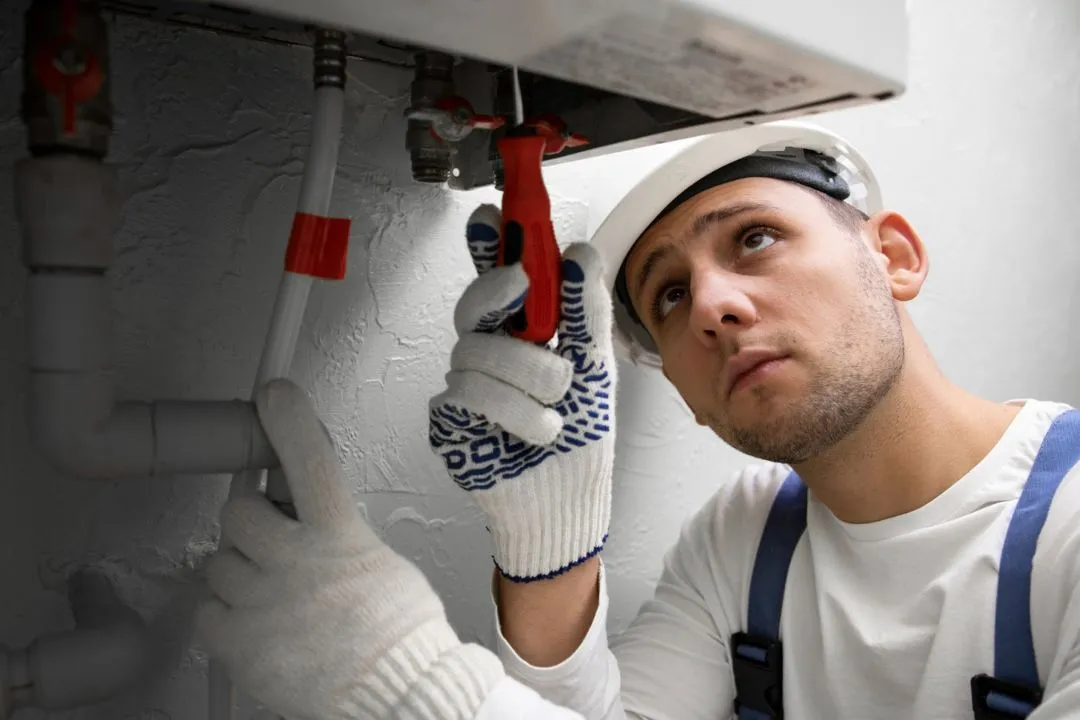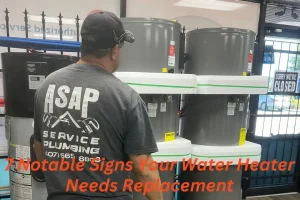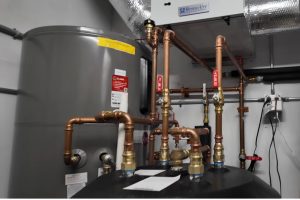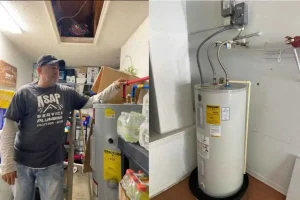However, sometimes, homeowners face a common yet serious problem: water heater overheating.
What happens when your water heater starts to overheat? It can lead to burning hot water, high energy bills, and even potential damage to your water heater. Preventing the problem soon can save you time, money, and hassle.
In this article, we’ll explain the causes of water heater overheating and discuss how to manage this problem effectively.
What If Your Water Heater Is Overheating?
An overheating water heater can cause a lot of problems. One of the biggest issues is safety. When a water heater overheats, it can cause burns.
Hot water can come out of the taps much hotter than expected. It is dangerous, especially for children. Another problem is damage to the water heater itself.
The high temperatures can wear out the heating elements and other parts inside the heater. It can be a reason for costly repairs or even the need to replace the entire unit.
Additionally, overheating can raise the pressure inside the tank. If the pressure gets too high, it can cause leaks, even an explosion.
An overheating water heater also wastes energy. It uses more electricity or gas to heat the water to higher temperatures, which can raise utility bills.
5 Culprit Behind Your Water Heater Overheating
It’s time to get an answer to the question- why is my water heater overheating? Here are the reasons we often notice that are causing the issue.
Malfunctioning thermostat
A malfunctioning water heater thermostat is an ordinary reason for water heater overheating. The thermostat controls the water temperature. If it breaks, it might not detect the actual temperature. As a result, the heater keeps heating the water against your command.
It can make the water dangerously hot. An unreliable thermostat can also lead to inconsistent water temperatures.
Sediment buildup
Sediment buildup is another cause of water heater overheating. Over time, minerals from the water settle at the bottom of the tank.
This layer of sediment can block the heating elements, which causes them to work harder and overheat. Hence, the water heater heating system can become less efficient and generate uneven water temperatures. If ignored, this buildup can damage the heater and increase energy costs.
Faulty temperature pressure relief valve
A critical component that can cause overheating is a faulty temperature pressure relief valve. It is designed to release excess pressure and prevent the tank from overheating.
If it malfunctions, the pressure inside the tank can build up dangerously. The water heater pressure relief valve fails to work properly, which can cause the water temperature to rise too high. This situation can be hazardous, potentially causing the tank to burst.
Electrical issues (For electric water heaters)
Electrical issues can frequently cause a water heater to overheat. Faulty wiring or connections can cause the heating elements to get constant power, leading to overheating.
Problems with the electrical components can also make the heating system work harder than necessary. It overheats the water and increases the risk of short circuits or electrical fires.
Blocked exhaust flue (For gas water heaters)
A blocked exhaust flue can cause your water heater to overheat. The exhaust flue allows harmful gases to escape from the heater.
If it gets blocked, these gases can build up. Thus, it can increase the pressure and temperature inside the tank. It can make the water heating element barely efficient and overheat the water.
Besides, this blockage can accumulate toxic gases in your home and create a dangerous situation.
Why Do You Need Expert Assistance to Resolve This Problem?
Expert assistance is required to resolve water heater overheating issues quickly. Your water heater might have problems like a malfunctioning thermostat, sediment buildup, or a faulty valve.
Whatever the problem, professionals know how to diagnose the cause accurately. Fixing these problems yourself can be dangerous and might lead to injury.
Experts can ensure the repairs are done safely and correctly. They also provide advice on preventing future issues.
Contacting ASAP Service Plumbing for water heater replacement in Orlando can save you time and ensure your water heater functions properly and safely.
How Do Professionals Resolve These Issues?
Generally, experienced plumbers in our team apply these techniques to fix water heater overheating issues.
Thermostat calibration
Experts in water heater repair start by turning off the power supply for electric heaters or shutting off the gas for gas heaters.
They then use specialized tools to measure the water temperature and compare it to the thermostat setting. If there’s a distinction, they adjust the thermostat accordingly.
In the case of electric heaters, they may also check the heating elements. For gas heaters, they ensure the gas valve and burner are functioning correctly.
Primarily testing water heater thermostat settings helps them maintain accurate temperature control.
Flushing sediment
For gas and electric heaters, our team connects a hose to the drain valve at the bottom of the tank and directs the water to a safe drainage area.
The valve is opened, and water is allowed to flow out. It carries sediment with it. This process is repeated until the water runs clear.
Inspecting heating elements
For electric heaters, they turn off the power supply and remove the access panels to inspect the heating elements for signs of wear or damage.
They use multimeters to test the elements’ resistance and ensure they are working properly.
In the case of gas water heaters, the burner and pilot light are inspected for proper operation. Our technicians clean any debris and check for flame color. If issues are found, they replace elements or parts.
Checking temperature pressure relief valve
The temperature pressure relief valve is a sensitive component. So, you are encouraged not to apply DIY skills if you are not an expert.
Our skilled plumbers start by turning off the power or gas supply and letting the water cool. They then locate the relief valve, usually on the side or top of the tank.
By lifting the valve’s lever, they test if water flows out and stops when it is released. It ensures the valve is working correctly. They also replace malfunctioning valves to maintain safety.
Conclusion
Professional maintenance for water heater overheating is important for safety, efficiency, and comfort.
Every problem, from a faulty thermostat to sediment buildup, needs careful attention and expertise. However, regular maintenance and timely professional interventions can prevent these problems from growing more intensely.
The easiest solution is to call our plumbers in Orlando to ensure that your water heater operates safely without overheating.
Frequently Asked Questions
How often should I have my water heater inspected to prevent overheating?
We recommend inspecting your water heater annually to prevent overheating and ensure optimal performance.
Is it safe to attempt DIY repairs for a water heater overheating issue?
DIY repairs for water heater overheating can be risky. It’s safer to consult a professional plumber to address the issue.
How does the temperature pressure relief valve prevent the water heater from overheating?
The temperature pressure relief valve prevents the water heater from overheating by releasing excess pressure and temperature buildup, maintaining safe operation.




